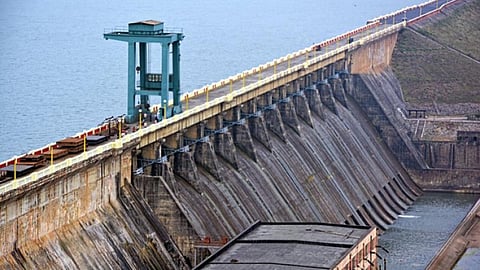
- Topics
- Feature
- Opportunities & Events
- Data
- Hindi Portal
- Topics
- Feature
- Opportunities & Events
- Data
- Hindi Portal

Under the ongoing Dam Rehabilitation and Improvement Programme (DRIP), the World Bank has approved Rs 11,000 crore for improving the safety and operational performance of 733 large dams across 18 states over the next 10 years. Besides operation, maintenance and emergency action plans, the programme will also focus on revenue generation at dams through tourism, fisheries, water recreations and solar and hydropower. The major dams which are to be covered in phase-II and III of the DRIP include Bhakra and Pong dam in Himachal Pradesh, Srisailam in Telangana, Koyna and Jayakwadi in Maharashtra, Matatila, Ramganga and Raj Ghat in UP, Ukai in Gujarat, Rana Pratap Sagar and Mahi in Rajasthan, Hirakud and Rengali in Odisha and Umiam in Meghalaya.
As per the data compiled by the Ministry of Agriculture and Farmers Welfare, the Centre provided just Rs 23,190 crore funds as against the financial assistance of Rs 1,23,605 crore sought by the state governments under the National Disaster Response Fund (NDRF). The data further shows that Tamil Nadu was the least favoured as it received just four percent funds against the total demand, followed by Rajasthan and Andhra Pradesh that received 11 and 21 percent of assistance sought. The States that received maximum funds are Uttarakhand, Uttar Pradesh and Maharashtra.
According to the analysis conducted by the Centre for Science and Environment, nearly half of India’s waste-to-energy (WTE) plants, meant to convert non-biodegradable waste, are defunct. The primary reasons for this are the plants’ inability to handle mixed solid waste and the high cost of electricity generated by them. The WTE plants produce power at nearly Rs seven per unit as against the thermal and solar sources that offer power at Rs three to five. Despite the poor track record, the government proposes setting up more WTE plants in the country.
As per a recent study by the Central Ground Water Board (CGWB), groundwater in 30 of the 36 districts in Maharashtra has the presence of heavy metals, such as lead and nitrate. Nitrate enters groundwater primarily through fertilisers, septic systems and manure storage and its ingestion in humans causes damage to the brain and nervous system. The study also indicated a decline in groundwater level in around 53 percent of the monitored wells across the state. The CGWB monitored a total of 1,623 wells in Maharashtra, of which 857 showed a decline in groundwater level over the decades average. The groundwater decline is attributed to severe over-extraction of water in the state.
Taking note of overflowing manholes in the city, the Bangalore Water Supply and Sewerage Board (BWSSB) has taken up a massive exercise to clean 2.4 lakh manholes in the city. The board plans to complete the new project in 18 months. The move comes as a major relief to citizens who have to pay between Rs 1,500-Rs 5,000 to get the manholes near their houses cleaned. The Board will be using jetting machines for the purpose. All the jetting machines are being equipped with GPS and all manholes are being tracked.
This is a roundup of important news published between February 13 - 18, 2019. Also read policy matters this week.